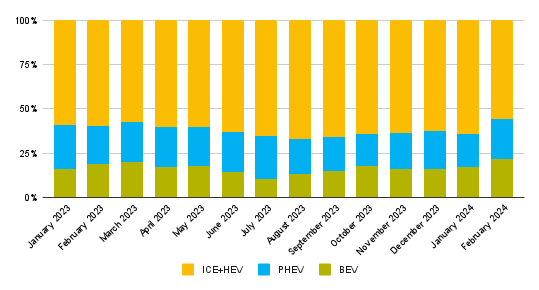Why expensive power could soon accelerate, rather than retard, the US EV adoption divide
Thus far US BEV adoption has largely been strongest in areas that have higher residential power prices. What if that became a feature, not a bug?

Swedish OEM Volvo reported sales of 22,266 fully electric and plug in cars globally in February, a year-on-year rise of nearly 8pc compared with the same month last year.
Meanwhile sales of ICE vehicles declined by 8.4pc to 28,049 across the same period.
February sales are an improvement on the seasonally weak month of January and above the monthly average for 2023, but below the levels seen in the last quarter of 2023.

The share of plug-in hybrids and fully electric sales has been growing, and in February accounted for 44pc of all vehicles sold — the highest share ever.
The market share of fully electrified models was also the highest ever, at 22pc of all vehicles sold during the month.

“This was mainly driven by the ramp-up of the company’s new fully electric small SUV, the EX30,” says Volvo in a statement.
First deliveries of the EX30 B-segment SUV began in the fourth quarter of 2023 and are ramping up in the first quarter of 2024.
Volvo has seen strong orders for the vehicle so far and believes it could become one of the highest selling models in terms of volumes.
The firm says it can sell the vehicle with a 15-20pc gross margin.
Volvo has a target for 50pc of its global sales to be fully electric by 2025, and all cars by 2030.
In Europe, the firm achieved a 33pc share of its sales from fully electric vehicles in February, the highest share ever in the region. But the share is lower in the US (4.5pc) and China (1.7pc).
Later this year the EX30 will be joined by seven-seat e-SUV the EX90, as well as the EM90 – targeted at the Chinese luxury MPV segment. All will be in full production by the middle of the year.
“We expect to grow considerably in the EV segment this year and to take further market share,” said CEO Jim Rowan last month.
Enjoying EV inFocus? Hit follow on Google News to get us in your feed.
Insider Focus LTD (Company #14789403)